

1,000+ Open Textbooks and Learning Resources for All Subjects. Rhizo14 Research. This research is now complete.
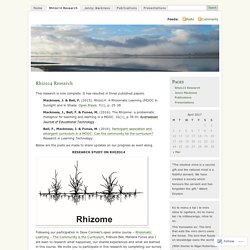
It has resulted in three published papers. Mackness, J. & Bell, F. (2015). Rhizo14: A Rhizomatic Learning cMOOC in Sunlight and in Shade. Open Praxis. 7(1), p. 25-38 Mackness, J., Bell, F. & Funes, M. (2016). Bell, F., Mackness, J. & Funes, M. (2016). Below are the posts we made to share updates on our progress as went along. Following our participation in Dave Cormier’s open online course – Rhizomatic Learning – The Community is the Curriculum, Frances Bell, Mariana Funes and I are keen to research what happened, our shared experiences and what we learned in this course. The survey will remain open until 11.45 pm GMT, Sunday 27th April 2014.You may edit your responses as many times as you wish until this time and date.
Free eLearning books. Since I am a great fan of open source software (Open Source Authoring Tools for e-Learning, Free and Open Source Web Conferencing Tools for e-Learning) and active member of online communities I created the following list with free e-Learning books. 41 Free e-Learning Books – (Update 10/11/2011)=> If you have read any of the following books I will highly appreciate if you share your opinion with the e-Learning community.
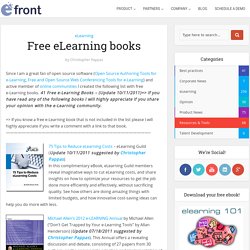
=> If you know a free e-Learning book that is not included in the list please I will highly appreciate if you write a comment with a link to that book. ————————————————————————————————————– 75 Tips to Reduce eLearning Costs – eLearning Guild (Update 10/11/2011 suggested by Christopher Pappas) In this complimentary eBook, eLearning Guild members reveal imaginative ways to cut eLearning costs, and share insights on how to optimize your resources to get the job done more efficiently and effectively, without sacrificing quality. => Resources Who are the Intended Readers? LLiDA Wiki: Learning Literacy for Digital Age (JISCK) Main/Home Page. Welcome to the LLiDA Wiki!
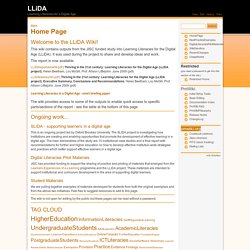
This wiki contains outputs from the JISC funded study into Learning Literacies for the Digital Age (LLiDA). It was used during the project to share and develop ideas and work. The report is now available: LLiDAreportJune09.pdf | Thriving in the 21st century: Learning Literacies for the Digital Age (LLiDA project). Helen Beetham, Lou McGill, Prof. Engaging students with social media – Blending for engagement. Social media is increasingly being recommended as an innovative method of supporting student engagement.
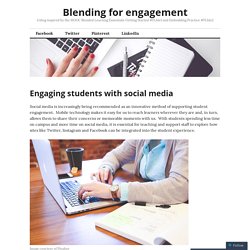
Mobile technology makes it easy for us to reach learners wherever they are and, in turn, allows them to share their concerns or memorable moments with us. With students spending less time on campus and more time on social media, it is essential for teaching and support staff to explore how sites like Twitter, Instagram and Facebook can be integrated into the student experience.
What do we mean by student engagement? Before you decide how to use social media to increase student engagement, you need to be clear about what you mean by engagement. Are you striving to improve attendance at classes or events? Cogneon Wiki. Beliebte Seiten.
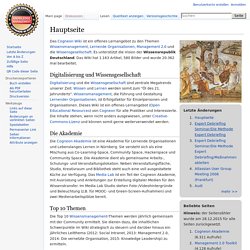
Handbuch CoScience/Aspekte der Kommunikation mit Wissenschaftsblogs – Handbuch.io. Einleitung Wissenschaftsblogs stellen ein sehr gutes Mittel dar, um mit Fachkolleginnen und -kollegen sowie der interessierten Öffentlichkeit zu kommunizieren und Ergebnisse aus der laufenden Forschung zu publizieren.
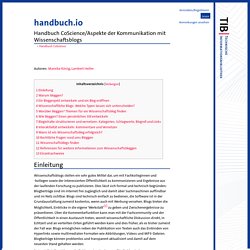
Dies lässt sich formal und technisch begründen: Blogbeiträge sind im Internet frei zugänglich und damit über Suchmaschinen auffindbar und im Netz sichtbar. Blogs sind technisch einfach zu bedienen, die Software ist in der Grundausstattung zumeist kostenlos, wenn auch mit Werbung versehen. Blogs bieten die Möglichkeit, Einblicke in die eigene 'Werkstatt'[1] zu geben und Zwischenergebnisse zu präsentieren. Über die Kommentarfunktion kann man mit der Fachcommunity und der Öffentlichkeit in einen Austausch treten, womit wissenschaftliche Diskussion direkt, in Echtzeit und an verteilten Orten geführt werden kann und dies früher, als es bisher zumeist der Fall war.
Warum bloggen? Zu den im Wissenschaftsbereich immer wieder genannten Gründen, warum gebloggt wird, gehören z.B. How to Create a Personal Learning Portfolio: Students and Professionals. This post explores Personal Learning Portfolios [PLPs], an extension of a Personal Learning Environment.
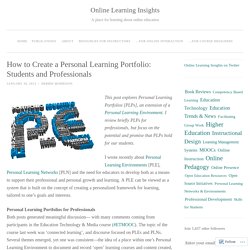
I review briefly PLPs for professionals, but focus on the potential and promise that PLPs hold for our students. I wrote recently about Personal Learning Environments [PLE], Personal Learning Networks [PLN] and the need for educators to develop both as a means to support their professional and personal growth and learning. A PLE can be viewed as a system that is built on the concept of creating a personalized framework for learning, tailored to one’s goals and interests. Pedagogical roles for video in online learning. CEL UX Honeycomb - Useful. How people learn, abridged version Here we turn to the work of cognitive psychologist Richard Mayer, and his cognitive theory of multimedia learning (Multimedia Learning, 2009): Figure 1.
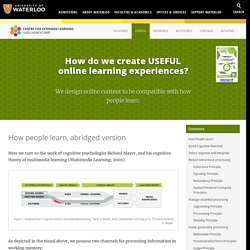
Adapted from “Cognitive theory of multimedia learning,” by R. E. Mayer, 2009, Multimedia Learning, p. 61. © 2001 by Richard E. As depicted in the visual above, we possess two channels for processing information in working memory: a visual channel for processing visual information (information that comes through our eyes); and a verbal channel for processing verbal information (information that comes through our ears). Importantly, each channel has limited processing capacity. Key take-away 1:Avoid cognitive overload – engage both channels.
Instructional Design Models Archives. All learning is necessarily hybrid. OLC Online Learning Journal. Journal of Educational Technology & Society. Honest and reliable Open Access Journals in Open and Distance Education. As part of Open Access Week, Javiera Atenas has shared the following list of open journals that have good quality control and editorial boards that are respected.
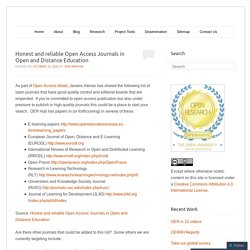
If you’re committed to open access publication but also under pressure to publish in high quality journals this could be a place to start your search. Edward T. Hall's Cultural Iceberg.